The end of the academic year generates many scholarly awards and honors for the AE student body
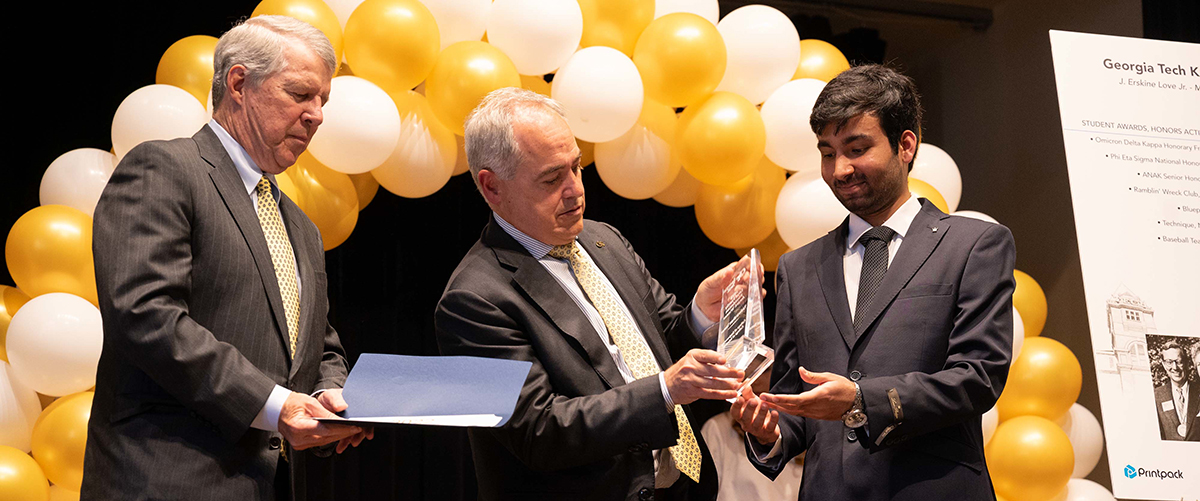 Yashvardhan Tomar receives the Love Family Foundation Award from Georgia Tech president, Ángel Cabrera.
Yashvardhan Tomar receives the Love Family Foundation Award from Georgia Tech president, Ángel Cabrera.
Love Family Foundation Scholarship
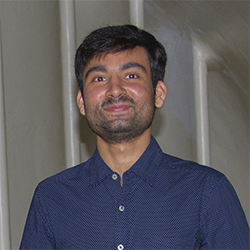 |
| Yashvardhan Tomar |
Aerospace engineering and astrophysics graduate Yashvardhan Tomar has been selected as the 2022 recipient of the Love Family Foundation Award, one of the Institute’s highest awards given to a graduating senior. The award recognizes the undergraduate student with the “most outstanding scholastic record of all members of the class” and includes a $10,000 monetary award. Each of the Institute's six Colleges nominates its top graduating student, and the winner is ultimately selected by the academic associate deans in coordination with the Office of Undergraduate Education.
“I convey my most earnest gratitude to the Love Family for bringing this glad, glad moment to life for me! This overwhelming support surely serves as a great impulse to propel me with strengthened promise and vigor towards the fulfillment of my aspirations—both as a researcher and as a citizen of the world,”
At the age of seven, he knew that he wanted to grow up to be a leading aerospace engineer and space scientist. With the help of Georgia Tech’s iGniTE program, which gives first-year students a head start on their college journey, he had a better sense of what he wanted to accomplish as an undergraduate student.
“Over the course of my undergraduate career I’ve both had the honor of representing Tech on numerous research platforms, and also endeavored to make the research experience more accessible and enriching for other undergraduate students,” said Tomar.
His curiosity and love of research led him to various Georgia Tech projects with the Vertical Lift Research Center of Excellence (VLRCOE), the Experimental Aerodynamics Lab, the John Harper Wind Tunnel to name a few. After graduating, he plans to rush home and meet family — who he hasn't seen in over three years. Later this summer, he will begin a Ph.D. program in theoretical astrophysics at Caltech.
Vertical Flight Foundation (VFF) Scholarship Award
AE students Carlota Bonnet, Aaron Crawford, Jahnvi Hariani, and Derek Anthony Safieh Matheu have been awarded Vertical Flight Foundation Scholarships. Master’s students Hariani and Safieh Matheu each received $4,000 and doctoral students Bonnet and Crawford each received $5,000 to continue their research at Georgia Tech. Awardees were recognized during the Vertical Flight Society's 78th Annual Forum & Technology Display, held May 10-12 in Fort Worth, Texas.
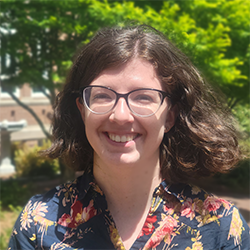 |
| Carlota Bonnet |
Carlota Bonnet received the Evan Sampatacos Scholarship, remembering the former McDonnell Douglas/Boeing engineer and designer. Bonnet is a Ph.D. candidate at Georgia Tech and holds dual French-Venezuelan citizenship. She moved to the United States to pursue higher education, obtaining her bachelor’s degree in aerospace engineering from Georgia Tech in 2019. Earlier this month she graduated with her master's degree in aerospace engineering.
As a graduate student she worked under the guidance of Prof. Marilyn Smith in the Nonlinear Computational Aeroelasticity Lab and is a member of the Vertical Lift Research Center of Excellence at Georgia Tech. Her research focuses on the computational modeling and effects of non-linear transverse gusts, and their applications on rotorcraft in urban environments. Once she completes her Ph.D. she plans to continue working on computation unsteady aerodynamics.
Aaron Crawford received the Dr. Dewey H. Hodges Scholarship named after the late AE School professor and researcher who passed away earlier this year.
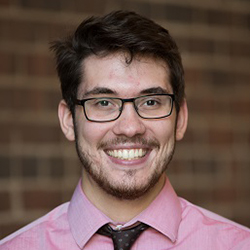 |
| Aaron Crawford |
“This award means a great deal. My particular scholarship is named for the late Dr. Dewey Hodges, a giant in the aerospace community and longtime professor at Georgia Tech. The fact that I was chosen for this scholarship means a lot and I hope to live up to a quarter of his legacy,” said Crawford.
The Ph.D. candidate received his bachelor’s degree in mechanical engineering from the University of Tennessee at Chattanooga in 2020. He currently conducts research under the direction of Prof. Marilyn Smith looking at the numerical modeling of fluidic oscillators and synthetic jets. Beginning this fall his research will investigate urban air mobility vehicle fatigue. Additionally, he has completed work through internships with the Army Research Lab Weapons and Material Research Directorate, and Army Aviation and Missile Command focusing on computational UAV predictions and wingtip propeller predictions.
“Coming from a non-aerospace undergrad I think this award comes with the knowledge that I have a place in the aerospace and vertical flight community. I think that is what I'm most excited about beyond the simple line on a resume”.
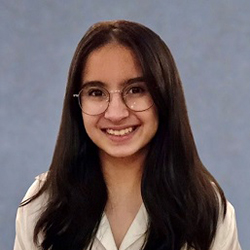 |
| Jahnvi Hariani |
Jahnvi Hariani received the Charles C. Crawford Scholarship, named in memory of the former Army Aviation development leader, Georgia Tech alumnus, Georgia Tech Research Institute (GTRI) researcher and past Vertical Flight Society (VFS) Board Chair.
“Being an international student in aerospace, I have not received many opportunities owing to the defense and citizenship restrictions. Not receiving internships when all my friends had one was very disheartening. But eventually I found my niche in vertical lift and gave it my all. Receiving this scholarship means a lot to me. It tells me that all my hard work did not go to waste and definitely encourages me to continue working on what I am interested in,” said Hariani.
The first-year master’s student is currently working on finite state wake modelling for rotorcraft in transient maneuvers as part of the Vertical Lift Research Center of Excellence (VLRCOE) and implementing the Velocity Potential Superposition Inflow Model (VPSIM) for different ground effect cases including hover/forward flight, inclined and partial, for single and multi-rotor vehicles, modelling the ground plane as mass source terms. Previously, she worked on analyzing the effects of inflow interference on induced power, and the evaluation of inflow models for UAM applications.
“I would definitely like to thank Dr. J.V.R. Prasad for giving me my first research opportunity in this field. He has been nothing but supportive and I owe a lot of this to him. And then I’d like to say to everyone who is close to giving up what they love doing because of the limited opportunities and restrictions, that it’ll work out. If you work hard, one day you get to prove everyone wrong.”
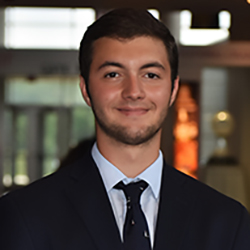 |
| Derek Anthony Safieh Matheu |
Derek Anthony Safieh Matheu received the Hal Andrews Scholarship, which remembers the preeminent Navy aviation engineer, advisor, and historian. The two-time VFFS recipient previously received the 2019 Marat Tishchenko Scholarship as an undergraduate student at the University of Maryland. He is currently an AE master’s student at Georgia Tech working with Prof. Juergen Rauleder on ducted fans and electric thrusters for regional air mobility.
"It was an honor to be awarded the VFF scholarship. This award has bolstered my motivation to continue my work in VTOL technologies and to pursue a combination of hands-on and theoretical practices during my studies. After receiving this award, I was able to pursue my own research interest focusing on the application of non-planar wing configurations on Tail-Sitter type vehicles,” said the Guatemalan native.
Department of Defense (DoD) Science, Mathematics and Research for Transformation (SMART) Scholarship
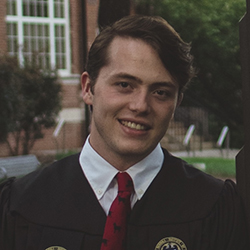 |
| Brenden Oates |
Brenden Oates received the Department of Defense (DoD) Science, Mathematics and Research for Transformation (SMART) Scholarship which financially supports undergraduate and graduate students pursuing degrees in science, technology, engineering and mathematics (STEM) disciplines as well as provides employment opportunities. Oates' scholarship includes full-time employment from the Naval Air Systems Command (NAVAIR) after graduation.
"This scholarship means a lot to me because it gives me the opportunity to continue my education and research at a higher level and to work alongside some very skilled and experienced engineers," said Oates.
He is currently researching under the direction of Prof. Marilyn Smith in the Nonlinear Computational Aeroelasticity Lab (NCAEL) where his research titled, Modeling and Testing of Rotating Helicopter Slung Loads in a Low Turbulence Wind Tunnel is working to better understand the dynamic instabilities of rotating bluff bodies in flow to provide more insight on a variety of aerospace applications.
"I am most looking forward to working for the Naval Air Systems Command and getting some hands-on work experience with high-speed wind tunnels and maybe even working offshore and around the country on new projects," said the recent graduate.
Amelia Earhart Fellowship
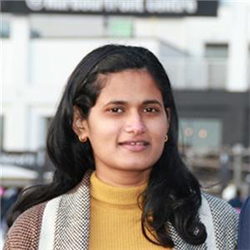 |
| Archana Tikayat Ray |
Doctoral student Archana Tikayat Ray has been selected as the 2022-2023 Amelia Earhart Fellowship recipient. The Fellowship was established in 1938 to honor legendary pilot Amelia Earhart, herself a member of the global women's advocacy and service organization.
Tikayat Ray’s interest in aerospace began in the fifth grade when her father gifted her a book titled, Kalpana Chawla: India's First Woman Astronaut. Since then, she has been drawn to aerospace engineering and dedicated her research towards improving systems engineering requirements. Advised by Prof. Dimitri Mavris, her research titled, Natural Language Processing for Aerospace Requirements Engineering aims to develop new natural language processing tools and techniques to improve various aerospace systems.
"I feel honored to have received the Amelia Earhart Fellowship, given Zonta International's commitment to supporting women in aerospace engineering and space sciences since 1938. I am pleased to join the group of Amelia Earhart Fellows who have gone on to become astronauts, aerospace engineers, heads of companies, etc. - I look up to them!”
Donnell W. Dutton Outstanding Senior in Aerospace Engineering Award
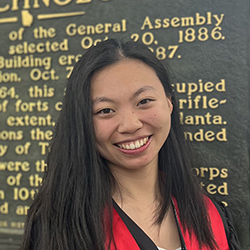 |
| Stacey Tian |
Stacey Tian was selected for the Donnell W. Dutton Outstanding Senior in Aerospace Engineering Award. The $1,000 award is given annually to a student who has demonstrated excellence both in and outside of the classroom.
"I'm really grateful to receive this award after four years of AE. During these years, I've worked with so many incredibly talented peers who would all be equally deserving of this award so I'm feeling very honored to be selected," said the New Zealand native.
As an undergraduate student Tian graduated with a 4.0 GPA and has served as an officer in the Georgia Tech chapter of Sigma Gamma Tau (the aerospace engineering honor society), teaching assistant, served as a mentor for tutors and was an officer for the GT Ramblin’ Rocket Club. Her research experiences include both spacecraft and aircraft projects with the Aerospace Systems Design Lab (ASDL). This summer she will move to Chicago to begin her full-time job at the Chicago Trading Company as a quantitative trading analyst.
Aerospace Engineering Outstanding Senior Scholar Award
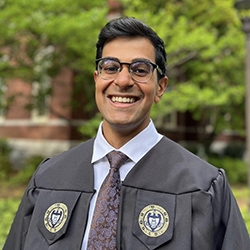 |
| Anonto Zaman |
Anonto Zaman was recognized with the Aerospace Engineering Outstanding Senior Scholar Award. Funded through an endowment established by former school chair Donnel W. Dutton, AE '40, the $1,000 award is given annually to the graduating student with highest cumulative GPA.
“Receiving the award was a massive honor, and I feel so lucky to have won it. It wasn't always easy balancing the commitments of school, clubs, and research, especially with the pandemic. That said, I couldn't have succeeded without the help of my professors, TAs, friends, and family. I am also hugely grateful to the AE School for all the opportunities it has given me over the past four years,” said Zaman.
The recent graduate is currently finishing up his research project with Prof. John Christian titled, Reconstruction of Particle Dispersion Events with Optical Measurements which focuses on modelling particle ejection events from small bodies such as comets and asteroids. His work experiences include interning with Sandia National Labs and Air Force Research Lab (AFRL), and the National Institute of Standards and Technology (NIST). He has a stunning array of research experiences in a robotics lab, combustion lab, and a space systems lab building cube-satellites.
Zaman will present his research during the upcoming American Astronautical Society (AAS) Astrodynamics Specialists Conference in August, and this fall he will begin pursuing his master’s degree in aeronautics and astronautics at Stanford.
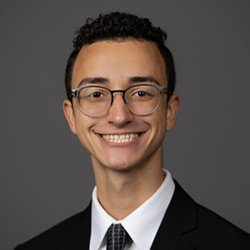 |
| Eliezer Zavala Gonzalez |
CoE Honors Award – Aerospace Engineering
Eliezer Zavala Gonzalez is a junior in the School of Aerospace Engineering and has earned a remarkable 4.0 GPA. He is active in the Georgia Tech Flying Club, Georgia Tech Motorsports, Society for Hispanic Professional Engineers (SHPE), and Sigma Gamma Tau. He was recently accepted as an intern at Northrop Grumman Space Systems and will start later this summer.
NASA Space Technology Graduate Research Opportunity (NSTGRO)
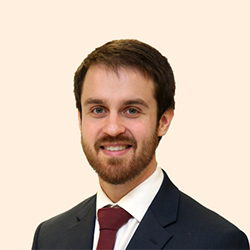 |
| Carl De Vries |
Carl De Vries has been awarded a NASA Space Technology Graduate Research Opportunity (NSTGRO) for his proposal titled, Illumination Invariant Terrain Relative Navigation. De Vries is a second-year doctoral student studying under the direction of Professor John Christian. According to NASA, The Fellowship is awarded to "graduate students who show significant potential to contribute to NASA’s goal of creating innovative new space technologies for our Nation’s science, exploration and economic future". In addition, each student will be matched with a technically relevant and community-engaged NASA Subject Matter Expert who will serve as the student's research collaborator, along with their faculty advisor.
"I'm thrilled to be selected for the NSTGRO Fellowship. Ten years ago, I failed out of college. It's been quite a long, yet worthwhile journey getting to this point. I'm particularly proud of the NSTGRO award because I think it acknowledges all my past effort while also trusting me to go further," said De Vries.
His pervious research included developing techniques for Light Detection and Ranging (LiDAR) visual odometry (VO) to capture higher quality images for future lunar missions.
"I'm most excited for the visiting technologist experience which is the opportunity to work on-site at a NASA center for 10 weeks each year. The insights from NASA engineers will help shape my research so that it can provide the most practical value for their terrain relative navigation goals. It will be a nice, extra point of pride presenting research that is well aligned with NASA's needs at the end of the fellowship," said De Vries.